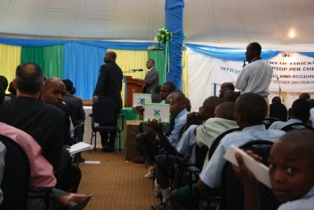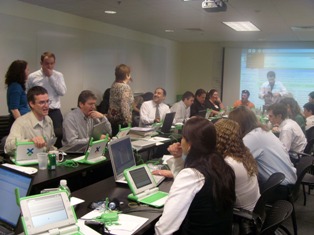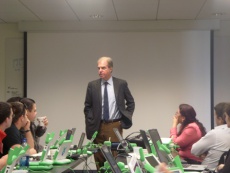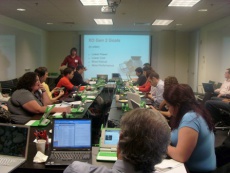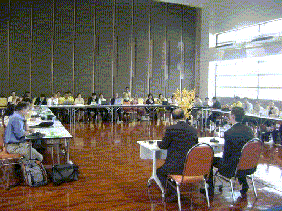Learning workshops
For presentations from Learning Team Members who assisted core teams in current XO deployments please visit:
Getting Started Guide | Deployment Guide
Learning Team Website: Coming soon
During end of 1st Quarter Holidays (April 5th-16th), we conducted a camp with 100 students at Nonko School, 50 at Kagugu and 50 at Rwamagana primary schools. During this camp, students developed their own projects about Malaria. The schools decided to hold an event on the occasion of World Malaria day, April 25th, to show their best projects.
This camp has been a great success, the great projects developed by students using Etoys book, or programmed dialogue using Scratch, have been shared within students and community around school on World Malaria Day, April 25th. The student projects were talking about what is Malaria, its causative agent (mosquito), most susceptible individuals in the community, transmission mode, prevention, mythology about Malaria, as well as efficient treatment.
During the camp, students did creative research about Malaria, trying to understand why not all mosquito cause malaria, and why mosquito bed nets should be used during the night while sleeping and not the during the day. Mythology and traditional beliefs about malaria were very important projects developed by kids, because they have grown up with different thoughts about this devastating disease for example: malaria can been treated traditionally using banana beer, or caused by eating sugar canes, bad spirits, or can be transmitted through sharing the drinks, etc.
The creativity, culture of researching, and constructing things to help the community using laptops created the most powerful outcomes of this camp. Our team contacted the national malaria program and they were happy to hear about our work and donated t-shirts to students at Nonko Primary School in honor of their completed projects.
Center for Laptops & Learning/OLPCorps Launching: Kigali, Rwanda, June 9, 2009

Summary:
The re-flashing process started on November 11th, 2010. The process was carried out in the compound of World Food Program in Kicukiro. WFP agreed to help the Ministry of Education with an access to its bound warehouse to store laptops and a facility of a room where laptops could be re-flashed, tested and inventoried. OLPC Rwanda greatly contributed to the planning and execution of this process. We prepared the procedure to be followed and improved it, into a reference document that is currently used by the Government team (see attached appendix 1: Laptops re-flashing procedure).
So far more than 50,000 XO laptops have been re-flashed, tested and deployed to 92 schools country wide.
Reflashing process:
The reflashing takes place in 8 phases, which are:
Removing XO laptops from their boxes: This was done by putting out the laptops from the box but considering to return the bags of the laptops in the empty box.
Updating Firmware
Reflashing using Nandblast: This was after updating the firmware in a laptop, so it may go to face the sever which is using the Nandblast that contains the new build with new activities proposed, then waits there till the reflashing is done.
Testing the hardware of the XO: This was to make sure that the laptop that is going to be sent to a school doesn’t have any hardware problem like mouse, screen, microphone touch-pad, etc. And also to test if the new built has been put on the XO during the reflashing.
Labeling: The labeling of the XOs was to put stickers on xos that show the name and the code of the school, the class in which the XO will be deployed.
Scanning: this was to compile data together, by scanning the code of the label on the XO and the S/N of the XO. This will help to know about all information on the XOs deployed in each school.
Labeling boxes: this was to help us to know how many boxes given to a school and how many XO laptops in each box. On each label on the box must be the name of the school, the code of the school, the province, the district in which the school is located and phone number of the Headmaster of the school.
Packaging: the packaging was done by making sure that each XO laptop returns in a box with a bag and being separated with it’s battery as it came from the store. This helps on the security of laptops while they are transported to a school.
While doing all these process, we were also aimed to explain to the Headmaster about the security, the role of the labels on the XO laptops and the guidance of the XO laptops.
Presentations
Pictures
Colombia Workshop: Bogotá, Colombia, March 3-6, 2009 
Overview
Los talleres de One Laptop per Child (OLPC) están diseñados para proporcionar a los participantes un enfoque pragmático de las computadoras portátiles para el aprendizaje, tanto en pequeña como en gran escala. La pequeña escala implica cómo los niños aprenden y cómo los niños usan las computadoras portátiles para el aprendizaje de forma productiva y divertida. A gran escala tiene que ver con crear ambientes de aprendizaje de alta calidad para todos, no sólo a unos pocos. Este taller es el primer evento que organiza OLPC en el país destinados a la creación de capacidad local y la formación de una red nacional de organizaciones involucradas e interesadas en iniciativas de OLPC.
El taller será práctico y concreto, sin embargo, no se limitará a formación técnica. Mientras que los participantes se familiarizan con las computadoras portátiles, podrán usar la experiencia concreta, como base para la reflexión sobre la proceso de aprendizaje.
Agenda
Presentations
- "Para una Educación con Futuro" (pdf)
- Fundación Marina Orth
- Implementación (pdf)
- Fundación Alberto Merani
- Integración curricular (pdf)
- Fundación Alberto Merani
- Modelo pedagógico del proyecto (pdf)
- Claudia Urrea PhD., Director of Learning for South America
- El Programa "Una Laptop por Nino" (pdf)
- Ministerio de Educación Perú
- Esta es la Historia del Primer Colegio "Mutual" (pdf)
- Fundación Alberto Merani
- XO y Aprendizaje (pdf)
- Claudia Urrea Ph.D, Director of Learning for South America
- Narración & Computación (pdf)
- Barbara Barry Ph.D, Learning Consultant
- Conectividad y Comunicación (pdf)
- Reuben Caron, Country Technical Support Engineer
- Sugar y el desarrollo de software (pdf)
- Rafael Enrique Ortiz y María del Pilar Sáenz, Sugar Labs Colombia
- TICs en Educación (pdf)
- Eugenio Severin, División de Educación BID
 African Regional Workshop: Kigali, Rwanda, September 29-October 1, 2008
African Regional Workshop: Kigali, Rwanda, September 29-October 1, 2008
Overview:
The One Laptop per Child (OLPC) African Regional Workshop is designed to provide participants with a pragmatic understanding of laptops for learning at both the micro and macro scales. The micro scale involves how children learn and productive, joyful ways to use laptops for learning. The macro scale involves how to create high-quality learning environments for everyone, not just a few.
The workshop will have two tracks. One destined to project managers and government representatives that will explore the macro level of the implementation of a country-wide laptops in education project. Another for teachers and students with the objective of explore powerful ideas about the use laptops in educational environments through construction and expression. His Excellency Paul Kagame, President of the
Republic of Rwanda concluded the workshop.
Agenda
Presentations
- CHASE: Child Health & Social Ecology (ppt)
- Felton (Tony) Earls, Principal Investigator
- CHASE: Child Health & Social Ecology cont. (ppt)
- Mary (Maya) Carlson, Co-Principal Investigator
 Cambridge Workshop: September 17-19, 2008
Cambridge Workshop: September 17-19, 2008
On September 17-19, 2008, attendees from around the world, mainly Colombia, Paraguay, Puerto Rico and Mexico, attended a learning workshop at OLPC headquarters. Participants walked away with a better understanding of the XO laptop, learning and the goals of One Laptop per Child.
Overview:
The One Laptop per Child (OLPC) Regional Workshop is designed to provide participants with a pragmatic understanding of laptops for learning at both the micro and macro scales. The micro scale involves how children learn and how children use laptops for learning in productive, joyful ways. The macro scale involves how to create high-quality learning environments for everyone, not just a few. This workshop is part of a larger series of events both at OLPC and in other countries and localities aimed at building local capacity and forming an international network of organizations to deploy one laptop per child.
The workshop will be practical and hands-on, yet it is not a mere technical training. Participants will become familiar with laptops for learning and will use the concrete experience as a basis for reflection upon the learning process. Participants will also learn from the examples of countries already adopting one laptop per child at national levels so as to plan how to best implement in their own countries. Participants will also get to know each other to form their own learning network so as to enable richer development in each country and the region.
List of Participants:
Cambrige Workshop Attendee List (doc) (pdf)
Presentations:
Day 1: Introduction to One Laptop per Child & Learning
You can also view these presentations (ppt and pdf files) on a machine without a PowerPoint viewer; please see the OLPC account at Slideshare.net
- International Operations (pdf)
- Robert Fadel, VP of International Operations:
- The XO & Learning (pdf)
- Claudia Urrea, Learning Team:
- Birmingham, Alabama Deployment (pdf)
- Julian Daily, Learning Team:
Day 2: Using the XO
- Software (pdf)
- Ed McNierney, VP of Software Development:
- Laptop Hardware (pdf)
- John Watlington, VP of Hardware Development
- Customizing Your XO (pdf)
- Julia Reynolds, Learning Team Coordinator:
- Country Technical Support (pdf)
- Kim Quirk, VP of Technical Support & Reuben Caron, Support Engineer:
- Power on the XO (pdf)
- Richard Smith, Director of Embedded Engineering:
- Storytelling with the XO (pdf)
- Barbara Barry, Learning Team:
- Learn 2 Teach, Teach 2 Learn (pdf)
- Angel Fernandez, Youth Teacher:
Day 3: Implementation
- Connectivity on the XO (pdf)
- Michail Bletsas, VP of Connectivity & Advanced Technology
- Real World Implementation (pdf)
- Claudia Urrea, Learning Team
- Paraguay Presentation (pdf)
- Cecilia Alcala, Raul Gutierrez, Miguel Martin
Suggested Reading Materials:
- Designing Multimedia Environments for Children Allison Druin and Cynthia Solomon
- Computer Environments for Children: A Reflection on Theories of Learning and Education Cynthia Solomon
- Symbolic Computing Brian Harvey's Logo computer science books
- Mindstorms, The Connected Family Seymour Papert
- The Children's Machine Seymour Papert
- TurtleArt by Artemis Papert and Brian Silverman
- Books by Allison Druin
- One to One Connections: Building a Community Learning Culture by Claudia Urrea
Discussion
Planning and Deployment
workshop for core team;
more comprehensive planning documentation;
guides for getting started - send this to the team;
what wiki pages you want to go to for starters?;
case studies;
whats needed for the members ofthe core team? - specific job description at regional, federal and local levels;
how do you transfer the knowledge;
level of self-certification;
how you know you are ready to work? - example- Geek Corps;
online training: form people who have already gone through the process
feedback - share your experience - you are part of the process and the community
____________________________
How do we sell the XO;
do you need a curriculum in order to learn?;
XO is not the only tool in the education;
suggestions:
teachers can share lesson plans/videos;
DoE should visit a pilot to see;
activites should have a goal and be a challenge;
have a model country;
place to share teacher's experiences;
learn more about XO in classroom;
a forum for teachers;
home use;
integrate to the community and family life (CEIBAL book)
_____________________________
core issue - need for social network - one place where everyone can come together university involvement- how does the the university - incentives in order to help be a community that helps to support OLPC - research credits, etc, ground support using wiki or facebook model for the creating network - reach teachers students tech suport - topic links, lesson plans, projects, archive of ideas, homework, -students - network with others, activities/games - blogs, sharing, etc indicators for Evaluation - # of users, exam scores, attritions rates, survey (teacher /student)
Photos
 Asia Regional Workshop: July 28-August 1, 2008
Asia Regional Workshop: July 28-August 1, 2008
The OLPC Asia Workshop, the first of several OLPC regional workshops, was held in Bangkok, Thailand at King Mongkut's University of Technology Thonburi (KMUTT) from Start date::July 28, 2008-End date::August 1, 2008. Participants came from across Asia and the South Pacific to participate; learn more about the future of learning, technology and, of course, the XO laptop.
The primary objectives of this workshop were to explore:
- a progressive deepening understanding of the learning process;
- how the XO laptop enables more effective learning through construction, expression, and collaboration;
- the roles of technology in general and one-to-one environments in particular;
- the pragmatics of children, laptops and learning;
- a regional and international network of practitioners of 1:1 environments
Please feel free to contact the OLPC Learning Team if you have any questions or concerns as you move forward:
- David Cavallo, Vice President of Learning: cavallo@laptop.org
- Nia Lewis, Manager of Learning Team: nia@laptop.org
- Julia Reynolds, Learning Team Coordinator: julia@laptop.org
Or members of the OLPC International Team:
- Anthony Wong, Director, Asia: anthony.wong@laptop.org
- Michael Hutak, Director, Oceania: hutak@laptop.org
Presentations
- Dr. David Cavallo, Vice President of Learning, OLPC coming shortly
- Using Computational Thinking as a means for Human Comprehension (pdf)
- Dr. Arnan "Roger" Sipitakiat, Professor, Chiang Mai University:
- Learners, Computers & the Storytelling Habit (pdf)
- Dr. Barbara Barry, Learning Consultant, OLPC
- Village That Learns (pdf)
- Mr. Paron Isarasena Na Ayudhaya, President, Darunsikkhalai School for Innovative Learning & Dr. Suchin Petcharugsa, Teacher, Northern Region Non-Formal Education
List of Participants
Participants of the Asia Workshop
Workshop Discussion
- Ms. Paola Dimaio has set up a google group for all participants. Feel free to join:
- Khun Pisuth Paliboonrat has set up a wiki page for the workshop:
 May Cambridge Learning Workshop: May 21-23, 2008
May Cambridge Learning Workshop: May 21-23, 2008
This is the fourth in a series of workshops to be held at OLPC or in countries to strengthen deployment teams so as to maximize learning. Attendees should have a focus on learning; administering and implementing a 1-to-1 laptop initiative; working with children; working with teachers, schools, and communities; developing activities and content, or other similar educational issues.
Agenda:
 May 20th Country Meeting: May 20, 2008
May 20th Country Meeting: May 20, 2008
The OLPC May 20th event was a one-day conference that was attended by government officials, business, and organization leaders from around the world. European Parliament member, Nerj Deva delivered the keynote address.
Agenda:
Attendee List:
Please see: http://wiki.laptop.org/go/Presentations/May_2008_Country_Workshop
for slides/video of presentations
